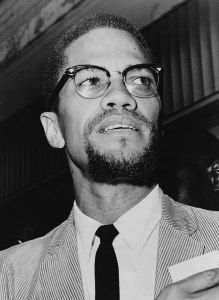
Malcolm X: ‘Who taught you to hate yourself?’

“In the past, the greatest weapon the white man has had is his ability to divide and conquer” — Malcolm X
The legacy of human rights advocate Malcolm X, a.k.a. El Hajj Malik El Shabazz, will be commemorated internationally this Friday, his 98th bornday anniversary. In New York City, filmmaker Spike Lee will be the keynote speaker at the Malcolm X & Dr. Betty Shabazz Center, and is commemorating the 30th anniversary of his “Malcolm X” movie. To RSVP livestream, go to: https://www.facebook.com/events/259441323123852/.
The 58th annual pilgrimage to Ferncliff Cemetery (Hartsdale, NY), where Malcolm’s and his wife Betty’s bodies are interred, leaves at 10 a.m. Friday morning. People start gathering at 125th Street and Adam Clayton Powell Jr. Blvd. at 9 a.m. The December 12th Movement’s annual “Shut’em Down” economic boycott of all businesses along 125th Street runs from 1-4 p.m.
Of Malcolm’s many contributions to the African diaspora, assisting the local lost and found Americanized-Africans in relearning their true heritage is one of the most significant ones. It helped in remedying the traumas caused by centuries of psychological, physical, and spiritual enslavement here in the wilderness of North America.
“Who taught you to hate the texture of your hair? Who taught you to hate the color of your skin…to such extent you bleach, to get like the white man? Who taught you to hate the shape of your nose and the shape of your lips? Who taught you to hate yourself from the top of your head to the soles of your feet? Who taught you to hate your own kind? Who taught you to hate the race that you belong to, so much so that you don’t want to be around each other?” — Malcolm X, during his “Who taught you to hate yourself” presentation in Los Angeles, May 5, 1962.
Whether as a progressive Muslim minister delivering weekly sermons at the Nation of Islam’s Temple #7 (then at 102 W. 116th Street), or as a fiery street-corner orator at African Square (125th Street/7th Avenue intersection), or from in front of Lewis Michaux’s African National Memorial Bookstore (125th Street/7th Avenue), he courageously spoke truth to power, inspiring many of those who witnessed him.
“Malcolm X was strong medicine,” TV journalist Gil Noble once noted at a City College of New York (138th Street and Convent Avenue) Malcolm X conference. “Many people were scared to say what he said in public. They only said those things behind closed doors.”
Malcolm X was an advocate for Black empowerment, often urging those watching to “do for self” and encouraging them to manage the businesses, education, politics, and socializing in their own communities. He also recommended that local citizens form rifle clubs and organize groups to “police the police” to minimize police brutality.
He used his Garveyite upbringing, as well as Nation of Islam training, to share inspirational messages that motivated people to build their own Black families and communities. Due to his success, he helped heighten awareness about both groups.
“A race of people is like an individual man; until it uses its own talent, takes pride in its own history, expresses its own culture, affirms its own selfhood, it can never fulfill itself.” — Malcolm X
Many people were reconnected to their African roots through his efforts, thus their self-esteem was raised immensely.
In recent years, Malcolm X Day has been observed nationally more commonly, with Berkeley, California, doing so since 1997; Illinois since 2015; and in Missouri since 2019.
The post Malcolm X: ‘Who taught you to hate yourself?’ appeared first on New York Amsterdam News.